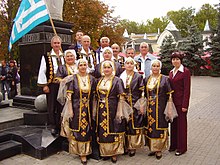
Back Μαριουπολίτικη διάλεκτος Greek Mariupolin kreikka Finnish Rumeíka Croatian Bahasa Yunani Mariupol ID Dialetto greco di Mariupol' Italian Румейский язык Russian Rumeyce Turkish Румейська мова Ukrainian
| Mariupol Greek | |
|---|---|
| румеку глоса | |
| Native to | Ukraine |
| Region | Northern coast of the Sea of Azov |
Native speakers | (20,000 cited 1989 census) 17 villages (2017 estimate)[1] |
| Cyrillic, Greek | |
| Official status | |
Recognised minority language in | |
| Language codes | |
| ISO 639-3 | – |
| Glottolog | mari1411 |
| Linguasphere | (?) 56-AAA-ak (?) |
| IETF | pnt-UA |

Mariupol Greek (natively known as руме́ку гло́са ([rʊˈmʲɛkʊ ˈɣɫosa])[3][4]), also known as Crimean Greek and Tauro-Romaic[5] (from Greek: Ρωμαίικα, "Romaic"; Ukrainian: Румейська мова, romanized: Rumeyska mova), is a Greek variety spoken by the ethnic Greeks living along the northern coast of the Sea of Azov, in southeastern Ukraine; the community itself is referred to as Azov Greeks.
Although Mariupol Greek, along with the Urum language, remained the main language spoken by the Azov Greeks well into the 20th century, currently it is used by only a small part of Ukraine's ethnic Greeks.[6]
- ^ Borodo, Michał; House, Juliane; Wachowski, Wojciech (2017-04-19). Moving Texts, Migrating People and Minority Languages. Springer. p. 34. ISBN 978-981-10-3800-6.
- ^ "Про затвердження переліку мов національних меншин (спільнот) та корінних народів України, яким загрожує зникнення". Official webportal of the Verkhovna Rada of Ukraine. 7 June 2024.
- ^ G. A. Animica; M. P. Galikbarova (2013). Румеку глоса. Donetsk.
{{cite book}}: CS1 maint: location missing publisher (link) - ^ A. A. Diamantopoulo-Rionis; et al. (2006). Румеиско-русский и русско-румейский словарь пяти диалектов греков Приазовья. Mariupol: Новый мир. ISBN 966-8605-36-5.
- ^ Moseley, Christopher (2008-03-10). Encyclopedia of the World's Endangered Languages. Routledge. ISBN 978-1-135-79640-2.
- ^ Cite error: The named reference
pawas invoked but never defined (see the help page).